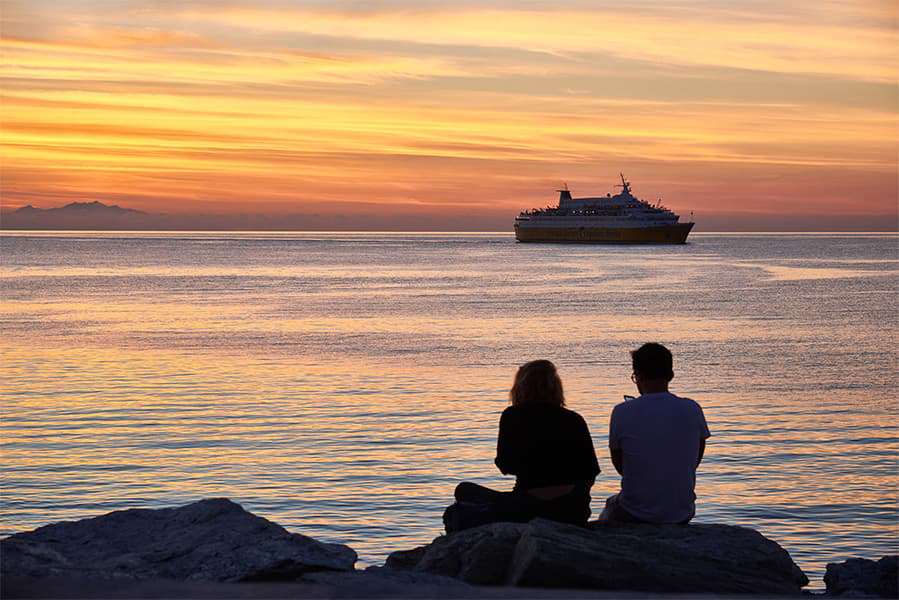Zeebrugge - Hull
Ferries to England
Zeebrugge - Hull
Ferries to England

At Direct Ferries you can compare Belgium to England ferries on the Zeebrugge Hull ferry route with our quick and easy live availability and best price search.
View timetables and prices of all Zeebrugge to Hull ferries ensuring you get the best price available for your ferry crossing. If there is an alternative route available that may enable you to save more then we’ll give you the price for that too.
Getting a quote or booking a ferry to England couldn't be easier. All you need to do is select Zeebrugge to Hull from the menus to the left, select the number of passengers and hit search!
More routes than anyone else.

Compare fares, times & routes in one place.
Change plans easily with flexi tickets.

Book e-tickets & manage trips in-app.
Live ship tracking & real-time updates.

Top-rated customer support when you need it.
Zeebrugge (meaning "sea landing) is a harbour-town on the coast of Belgium, a subdivision of Bruges, for which it is the modern port. It serves as an international Port and a seafront resort with hotels, cafés and beach. Zeebrugge has been instrumental in Brugge's reinvigoration as a city, which unfortunately lost its harbor to silting hundreds of years ago. The construction of the new seaport at Zeebrugge began at the turn of the 20th century and the city's reputation as an art and tourist center for Northern Europe began its revival. The marina is also Belgium’s most important fishing port, and the wholesale fish market located there is one of the largest in Europe. Aside from being a passenger port with ferries to the UK, the harbour serves as the central port for Europe's automotive industry and is important for the importation, handling and storage of energy products, agriculture products and other general cargo.
Ever since being founded as a market town in the 12th Century to facilitate the trade of cotton, the city of Hull in the north-east of England has had plenty of guises throughout its history. It has served as an army garrison during the English Civil War, a thriving whaling station during the Victorian era, and was once the country’s major industrial seaport; no doubt due to its enviable position near the North Sea on the banks of the broad Humber estuary. Today, with fishing and seafaring no longer such big business, the city has undergone yet another transformation. Though remnants of Hull’s diverse history can still be seen between the cobbled streets of the Old Town and by the docks of the harbour, modern arts and culture is now the cornerstone of the city’s economy. The Museum Quarter, where the birthplace of anti-slave advocate William Wilberforce can still be found, is nationally renowned; while the downtown districts, riven in two by the snaking River Hull, are crowded with art galleries and theatres. Hull’s metamorphosis from a fading industrial light to glittering cultural hub was completed by the announcement that it would be crowned the UK City of Culture in 2017. The ferry terminal in Hull is found at the eastern end of town, on a harbour known as King George Dock. This relatively large and modern facility boasts plenty of passenger amenities including toilets; a long-stay, multi-tiered carpark; an open plan waiting hall; vending machines selling food and drink; and a streamlined check-in service that makes boarding the ferries a quick and painless experience. The port is just a few minutes’ drive from the city centre along Hedon Road. This route is regularly traversed by buses and coaches leaving from a depot found just outside the ferry terminal. Those travelling to the port from further afield can reach Hull via the network of main roads and motorways that circle the city, including the A15 route that cuts north and south across the remarkable Humber Bridge, a suspension bridge that was once the largest of its kind in the entire world. Two ferry services currently operate from the port. Routes hosted by P&O Ferries sail out from the mouth of the Humber before heading south towards the European mainland. These services head to the port towns of Zeebrugge in Belgium and Rotterdam in the Netherlands at various times throughout the week.